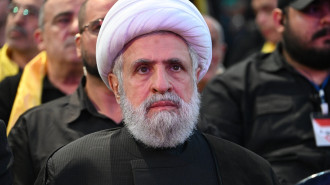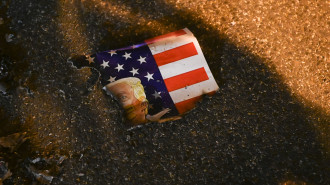![A protester lifts a Palestine scarf with the Palestinian flag during a demonstration held in front of Tunisia's parliament's building in the city of Bardo Tunis, Tunisia, on 18 May.[Getty]](/sites/default/files/styles/image_360x240/public/2021-05/GettyImages-1232976351.jpg?h=6f8e8448&itok=McJpctFl)
How digital activism is putting the global spotlight on Palestine
![A protester lifts a Palestine scarf with the Palestinian flag during a demonstration held in front of Tunisia's parliament's building in the city of Bardo Tunis, Tunisia, on 18 May.[Getty]](/sites/default/files/styles/image_360x240/public/2021-05/GettyImages-1232976351.jpg?h=6f8e8448&itok=McJpctFl)
The recent escalation of violence in Israel-Palestine has led to a noticeable increase in organised online campaigns by Arab and Palestinian social media activists.
Using the hashtags #SaveSheikhJarrah and #GazaUnderAttack in both English and Arabic, activists have disseminated multimedia accounts of the latest Israeli attacks, Palestinian victims, and the destruction left behind.
These hashtags have been used over seven million times in the past month, with cyberactivism and real-time reporting putting a spotlight on the struggle for Palestinian rights.
"This time we are stronger and more united," Gaza-based social media influencer and writer Omar Ghraieb told The New Arab.
"Online activism has caught the attention of both celebrities and people in power"
"We are all swimming in the same flow and amplifying each other… The impact of social media is powerful. [It] has helped us reach the world faster and in a wider sense."
Online activism has also caught the attention of both celebrities and people in power, Ghraieb says.
One example, he notes, was the global outcry over Israel's destruction of the Al-Jalaa Tower housing the AP and Al Jazeera's offices in Gaza, which was bombed on live TV.
He also points to the increasing activism of influential celebrities such as Palestinian-American supermodel Bella Hadid, Viola Davis, Mark Ruffalo, Dua Lipa and Natalie Portman, among many others.
|
|
During the recent fighting, Israeli airstrikes on the Gaza Strip killed at least 254 Palestinians, including 66 children. An estimated 58,000 Palestinians were displaced, with 2,000 housing units destroyed. In Israel, 12 civilians, including two children, were killed by Hamas rockets.
Tensions had escalated in the weeks before following Israeli efforts to forcibly expel Palestinians from their homes in the East Jerusalem neighbourhood of Sheikh Jarrah and attacks on worshippers at the Al-Aqsa Mosque.
To Ghraieb, the online coverage of Sheikh Jarrah captured international attention. "We were the top headlines of all international media and the most trending hashtags for a full 10 days. That says a lot, no?"
Citizen journalism
Filmmaker and social media influencer Ala Hamdan and her friend Muna Hawwa started a series of live sessions from Palestine on Instagram when Israeli forces attacked the Al-Aqsa Mosque.
"First, the views were 1,000, and then 2,000 views, and then we ended up reaching 120k views," she said.
"Public figures from around the world joined from Turkey, UK, US, Canada, The Middle East, The Gulf, and North Africa. This created a huge base of young, hyper-creative audiences that found themselves part of this important cause."
According to her, live, on the ground accounts in Palestine "were the main reason the live sessions reached millions."
"The impact of social media is powerful. It has helped us reach the world faster and in a wider sense"
Social media censorship
However, many social media users have reported that their posts are being censored.
For example, Twitter temporarily restricted the account of Palestinian-American writer Mariam Barghouti, who had been posting photos and videos of the violence in Jerusalem.
Meanwhile, advocacy organisation Access Now wrote a Twitter thread decrying what they describe as the systematic censorship of Palestinian posts on Facebook, Twitter, Instagram, and TikTok.
They have received hundreds of reports that social platforms are suppressing Palestinian protest hashtags, blocking live streams, and removing posts and accounts.
"Instagram and Facebook were labelling most of the content that we were posting online related to Palestine, be it the Israeli aggression on Gaza or the compulsory dispossession in Sheikh Jarrah. It was labelled as 'Sensitive Content,'" said Ghraieb.
|
|
"Some of my posts were removed or hidden by Facebook. On Twitter, the trending hashtags would suddenly stop appearing," he added.
Amman-based social media expert and trainer Khaled El-Ahmad agreed.
"There is tremendous pressure on tech companies from the Israeli government to censor Palestinian content, so there were keywords set to trigger a ban for any account using them, such as Al-Aqsa or Hamas."
"Technically, this is wrong," he added. "There is no way to find out the context of this dialogue as I could be talking negatively about Hamas rather than promoting them. Also, Facebook expanded the definition of hate speech to include words like Zionists, and this is not right as Jews are different than Zionists."
Responding to the accusation, Instagram apologised, saying that many accounts couldn't post Palestinian content for a number of hours on 6 May and that some accounts were blocked, adding it was part of a broader technical problem that affected posts from a number of countries about a wide range of topics.
Adam Mosseri, the head of Instagram, tweeted: "Many people thought we were removing their content because of what they posted or what hashtag they used, but this bug wasn't related to the content itself."
However, Mona Shtaya, the local advocacy manager at 7amleh, the Arab Center for Social Media Advancement, disagreed.
"There is tremendous pressure on tech companies from the Israeli government to censor Palestinian content"
Speaking to Al Jazeera, she said: "We are still receiving reports on content takedowns and account suspensions on Facebook, Instagram, and Twitter,"
"The excuses that have been used by the companies, such as 'global technical bug' are neither logical nor convincing."
Asked what advice they give to online activists who want to spread the word about their cause, Khaled El-Ahmad encouraged the use of storytelling.
"Remember you are sending your message globally, so you need to think of how other nations think. Don't post everything, post selectively, post content that can resonate with others on a human level. Don't post graphic photos and learn how to make each platform work."
Meanwhile, Ala Hamdan cautions against getting dragged into social media wars. "Say your word, and move on," she said. "Small arguments and debates get you nowhere. Focus your energy on shedding light on those who were forced to live in darkness for a long time."
Ghraieb emphasised setting "some crucial standards like accuracy, authenticity, respect, thinking twice, being friendly, showing appreciation, and making sure to stay true to yourself and your cause."
Natasha Tynes is an award-winning Jordanian-American author and communications professional based in Washington, DC. Her byline has appeared in the Washington Post, Elle, Esquire, Al Jazeera, Huffington Post, and the Jordan Times, among many other outlets.
Follow her on Twitter: @NatashaTynes
![Nearly 200,000 protesters marched through central London in support of Palestine on 22 May. [Getty]](/sites/default/files/styles/medium_16_9/public/2021-05/GettyImages-1233056533.jpg?h=9eb0d413&itok=6_82pMlX)
![Protesters gather in front of the Consulate General of Israel in Los Angeles, CA on 18 May 2021 to protest in solidarity with Palestinians. [Getty]](/sites/default/files/styles/medium_16_9/public/2021-05/GettyImages-1232972973.jpg?h=c6980913&itok=_M_v_Bkm)
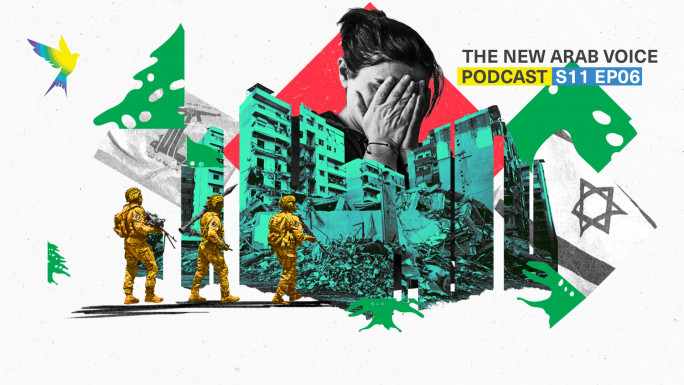
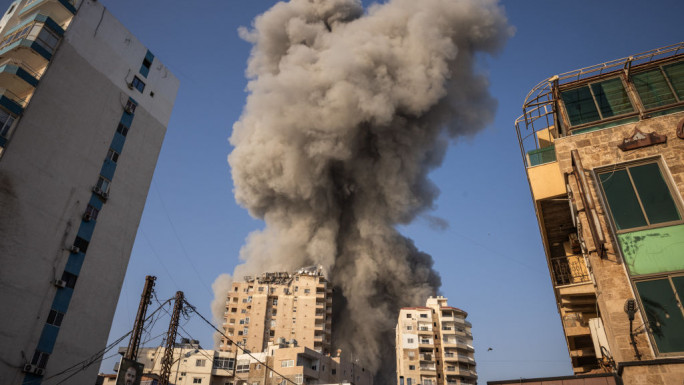
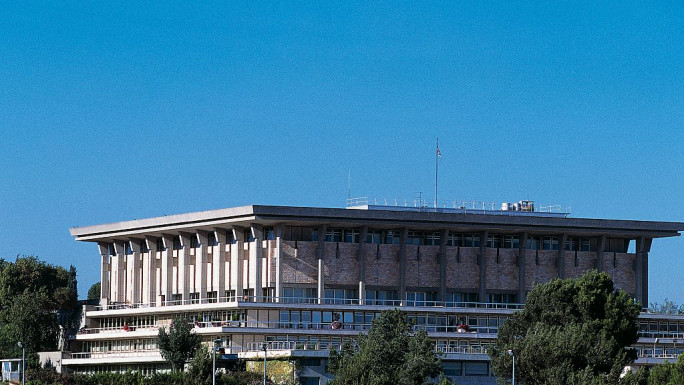
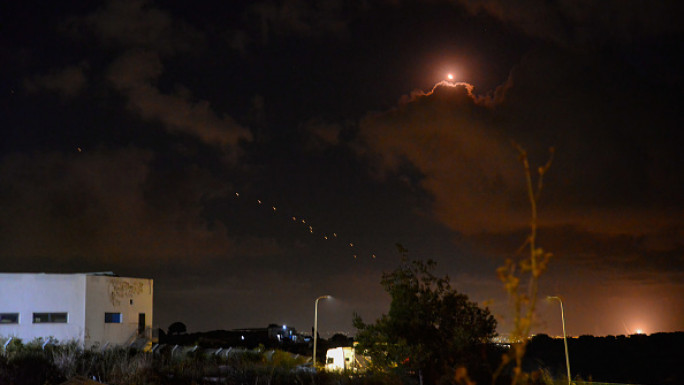
 Follow the Middle East's top stories in English at The New Arab on Google News
Follow the Middle East's top stories in English at The New Arab on Google News

